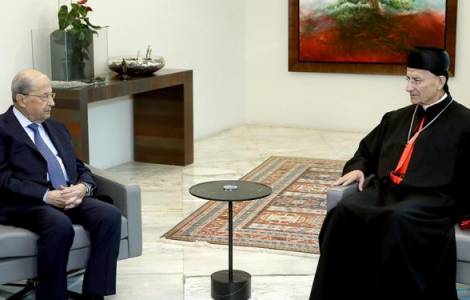
abouna.org
Beirut (Agenzia Fides) - An "institutional compromise" to overcome the crisis following the tragic events of Thursday October 14th, when seven Shiite demonstrators in Beirut were killed by snipers on the roofs of the Christian neighborhood of Tayyouneh-Ain al Remmaneh, suggested Cardinal Béchara Boutros Raï, Patriarch of the Maronite Church, who attended a series of meetings with the highest institutional leaders in the country yesterday, Tuesday, October 26th. In just one day, the Primate of the Maronite Church was welcomed by President Michel Aoun (a Maronite Christian), Prime Minister Najib Mikati (a Sunni Muslim) and President of Parliament Nabih Berri (a Shiite Muslim) for talks that followed up his proposals to defuse the dangerous political and institutional conflicts that paralyze the country - grappling with a devastating economic crisis - and project on the lives of millions of Lebanese the nightmare of a return of the bloody conflicts of the civil war. To the journalists, the Maronite Patriarch limited himself to speaking of a "constitutional and legal" proposal. He tries to mediate political solutions to the crisis before armed conflict breaks out. "During my visits to those who are directly involved in the political process", declared the Lebanese Cardinal, "I have affirmed that politics should precede events and not follow them. Political action means anticipating events and finding a way to deal with them before they escalate". "Things are not solved on the street, and we have seen what happens when you take to the streets", said the Patriarch, referring to the recent bloody events that took place in in Beirut.
Politics is the art of anticipating events and resolving problems before they escalate, and I hope politicians will act from that perspective. If not, what we now see happening will happen, with chaos in the streets and the emergence of weapons, both legal and illegal".
Lebanese analysts described the Maronite Patriarch's proposal as an attempt to find solutions to a "broad compromise at the highest level" and thus to gain the approval of the main political blocs in order to calm the current disputes and the political confrontation on the elections to postpone next year (parliamentary elections and election of the new President of the Lebanese Republic). In this context, the analysts stress, with a view to the upcoming election campaign, that politicians have already taken a strong position, reflecting the intricate interweaving of local, regional and global factors that determine political and social life in Lebanon. (GV) (Agenzia Fides, 27/10/2021)
 ASIA/IRAQ - Post-election chaos, the Chaldean Church calls for "national dialogue" to avoid disaster
ASIA/IRAQ - Post-election chaos, the Chaldean Church calls for "national dialogue" to avoid disaster